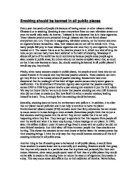Should Smoking Be Banned in Public Restaurants?
In the perfect situation, smoking policy would be set by bar or restaurant owners, and customers would patronize the establishments with the policy they prefer. Customers would decide—without the government’s help—if they want to avoid smoke-filled rooms or enter them. They might even choose to sit in an area sectioned off for smokers or non-smokers, but the ultimate issue is choice (Ruwart 1). When the government starts telling restaurant owners what their customers can and cannot do, the government is overstepping its boundaries.
Our government aims to protect us—to save us from society’s evils. However, in an attempt to protect the public from the effects of passive smoking (second hand smoke)—of which, according to the nonpartisan Congressional Research Service in 1994, “the statistical evidence does not . . . support a conclusion that there are substantive health effects . . .” (Krauthammer)—the feds have failed to protect a vital part of the U.S. economic population: business owners. Many people who drink also tend to smoke; banning drinkers from smoking has hurt business in some bars and restaurants. “According to the California Licensed Beverage Association, business has dropped as much as 85 percent . . . since the prohibition took effect” (“Bar Owners Vow” 1). The decrease in customers and subsequent loss of revenue has far-reaching effects on employers. A study by the American Beverage Institute entitled “Effect of 1998 California Smoking Ban on Bars, Taverns, and Night Clubs” asked 300 respondents about the effects of the ban on their businesses. When asked if the ban caused owners to lay off employees or cut working hours, 29.7 percent of respondents answered “yes”; 59 percent gave the same answer when asked if they experienced a loss of tips/gratuities for bar and serving-staff employees (1). The plight of restaurant and bar owners is often ignored, but it is a serious issue for them and for their employees.








